This blog had a few minor updates in terms of additional examples of fallacies, a larger update on August 24, 2022, some in-between updates after this and a major update again on December 6, 2022, with new fallacies from Skepsis board members Pepijn van Erp and Aliette Jonkers in 2022. These can be recognized by the blue sphere: / 🔵 2022 / at the caption and by the / 🟢🟢🟢🟢🟢🟢 2022 /where it is shown how a fallacy can fall under various categories.
Swamps of Sadness. It is a barren swampland with quicksand-like mud pools. Anyone who becomes depressed while in the swampland sinks into the mud and drowns. Source
“Die Sümpfe der Traurigkeit” appear in Michael Ende’s “The Neverending Story” Featured image: Michael Ende, Die unendliche Geschichte, Illustriert von Sebastian Meschenmoser, Thienemann Verlag, page 60.
t.l.d.r. The collision course and demise of online skeptical discussions demonstrated on the basis of a partial history of the Dutch Skepsis Foundation, its board members, discussion forums and social media, especially Twitter
Content
Skepsis 2005-2014
Kloptdatwel.nl 2011-
The Pandemic
Block, blocker, blocked
The price of hurtful words
How then?
Mrs Screenshot
Fallacies and other not-niceties
The next danger
Update (August 24, 2022 f.f.)
❕Practical note beforehand. In order to make this rich multi-media text quickly retrievable and suitable for various platforms, the smallest size images were chosen. You can view the images in large format by right-clicking “Open image in New Tab”.
Skepsis 2005-2014

In 2004-2005 I became involved with the Dutch Skepsis Foundation, when TV host Irene Moors brought together the heads of Rob Nanninga, Jan Willem Nienhuys, both board members of Skepsis, me and many hundreds of others in the FOK topic about self-proclaimed “There Is So Much More” medium” Robbert van den Broeke.

Robbert van den Broeke discussed his critics Jan Willem Nienhuys and me on his YouTube channel. I have already published a lot about him and the group around him on parameter.blog.

My interest arose from my own background: I had (already, more followed) published a book about out-of-body experiences.

With that I had appeared in, among others, the highly popular Dutch talk show Kopspijkers.

An active time with more than 50 topics about the Hoevense self-proclaimed medium followed. The mostly “paranormal” oriented discussions led via FOK to the website of the Skepsis Foundation, where Rob Nanninga was a board member since 1987 and also editor-in-chief of the Skepsis magazine “Skepter” and webmaster since 2002. I also got to know Nanninga and Nienhuys behind the scenes. A friendship with ups and certainly as many downs followed, but it was clear: something special had arisen here between two official Dutch skeps and myself. Nanninga, for example, had me design the front of the Skepter twice.

I attended several Skepsis conferences and in 2010 the James Randi event in Utrecht.

Rob Nanninga and I also discussed the “para photos” of Van den Broeke together and imitated them successfully.
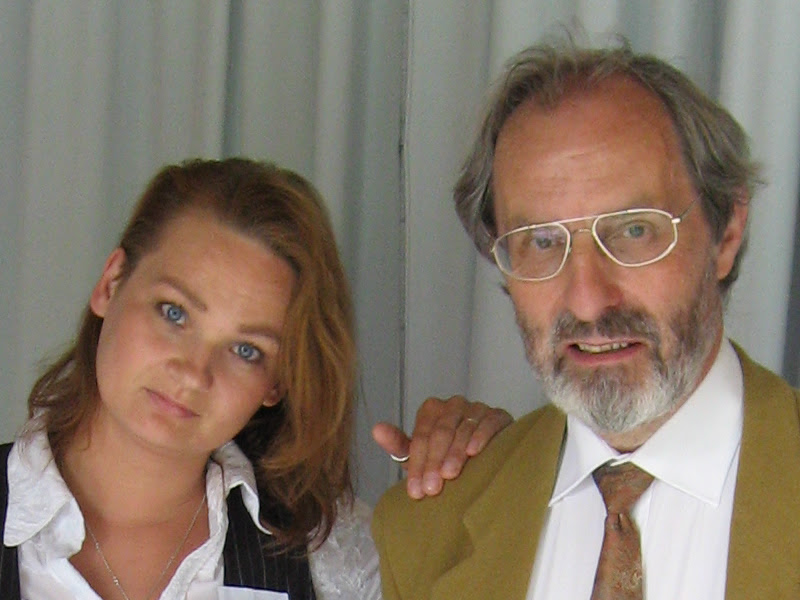
In addition, I had ties with “the other side”: Merkawah (nowadays: Network Near-Death Experiences) and also visited their conference with well-known attendees such as photographer, astrology researcher and writer Rudolf Smit and cardiologist, researcher and writer Pim van Lommel.

In the years that followed, I purposely stayed close to the Skepsis Foundation. Idealistic as I was, I hoped to build a bridge between the “altos” and the “skeps”. In the early days I called myself spiritual, meaning conscious living, looking for answers to existential questions such as: is the Earth a karmic school for people, does reincarnation exist, is there life after physical death? The skeptical and scientific side also interested me explicitly. With my own background, especially in remembering and writing down dreams and experiencing out-of-body experiences, I hoped to contribute to more knowledge among discussion participants, but also to adjust my own ideas about this spirituality if I discovered shortcomings in it. Gradually I learned a lot and that was not only about the content, but also about the form of the discussion. I had never been taught arguing in school, at least not concerning the forbidden use of fallacies. And I can already tell you that, thanks to my time among skeptics, I also adjusted my ideas substantively, from “Certainly, out-of-body experiences must be proof of life after death” to “There are enough indications that the human mind is very versatile, and perhaps the spirit’s survival after physical death is indeed a reality.” So I started to learn both in terms of content and discussion forms!
The highlight was the discussion about Pim van Lommel’s blockbuster “Consciousness Beyond Life”. In addition to Rudolf Smit, psychologist and philosopher Titus Rivas and anesthetist Gerald Woerlee also made their appearance.
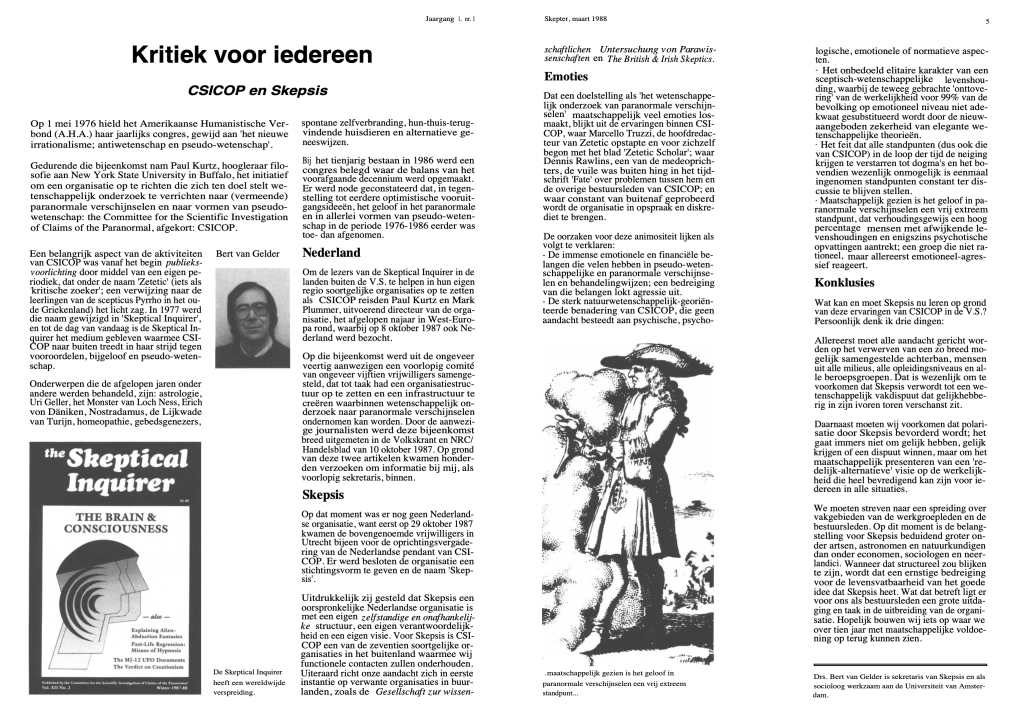
Like me, Rudolf Smit is active on both sides. He was present at the founding meeting of the Skepsis Foundation in the International School of Philosophy in Amersfoort in 1987 (at 8 Dodeweg! ;-)). Incidentally, Jan Willem Nienhuys mentions another location, namely the Humanist Association in Utrecht, but also says that there was an earlier attempt at founding. The first Skepter issue appeared in March 1988. In that issue, essential matters such as the goals of the Skepsis Foundation are discussed. Although Skepsis was founded in response to the ambitions of the Committee for the Scientific Investigation of Claims of the Paranormal, abbreviated: CSICOP, and in particular of its very active founder, skeptic and secular humanist Paul Kurtz, Skepsis wanted to be an entirely Dutch experience. with the aim of bringing together as many noses as possible from as many directions as possible for a fruitful, colorful and broad discussion:

“Conclusions
What can and should Skepsis learn from these experiences of CSICOP in the US? Personally I think three things:
First of all, all attention must be focused on acquiring the broadest possible base of supporters, people from all backgrounds, all levels of education and all professional groups. This is essential to prevent Skepsis from becoming a scientific dispute that is entrenched in its ivory tower.
In addition, we must prevent polarization from being promoted by Skepsis; after all, it is not about being right, being proved right or winning a dispute, but about presenting a ‘reasonably alternative’ view of reality to society that can be very satisfying for everyone in all situations.
We must strive for a spread over the professional fields of the working group members and the board members. At the moment, there is significantly greater interest in Skepsis among doctors, astronomers and physicists than among economists, sociologists and Dutch scientists. If that turns out to be structural, it will be a serious threat to the viability of the good idea called Skepsis. In that respect, we as board members face a major challenge and task in expanding the organisation. Hopefully we will build something that we can look back on with social satisfaction in ten years’ time. Drs. Bert van Gelder is secretary of Skepsis and works as a sociologist at the University of Amsterdam.” Source: Skepter Volume 1, Issue 1, 1988.

Smit’s contact with Nanninga and Nienhuys dates from about 1990. Smit used to be an astrologer, but after a disconcerting experience with an erroneous exchange of client data, where the client in question had been very satisfied with the interpretation intended for another lady, he had rejected the belief in astrological eloquence. On November 10, 1990, Smit gave a lecture at the Skepsis congress and he had also published several times in the Skepter (volumes 1990, 1992, 1995). His turn from practicing astrologer to astrology skeptic caused Smit to suffer three years of depression, but he had the open-mindedness to adjust his worldview and wrote a raw-honest piece about it.

Hot Skepsis topics were next to Pim van Lommel’s book “Consciousness Beyond Life”, the astrology-Gauquelin discussions, the AWARE studies of Sam Parnia and related near-death experiences topics, the Dentures man and the Pam Reynolds case.

During the vigorous discussions, there were certainly some serious chips, such as Martin Bier’s statement that Pim Van Lommel’s book costs human lives. Martin Bier is occasionally, but for many years already active on the two Skepsis websites, on skepsis.nl and on klopdatwel.nl, and has a PhD in physics.

However, the language remained well under control, there was usually no swearing and the impression was not given that – I am exaggerating only a little now, I think – only stupid and smart people exist on this globe.

The discussions among a mixed group meandered on, among others, genverbrander.nl (registered by me first), stenoomen.nl, kloptdatwel.nl and for example tasmedes.nl. Nienhuys posted on the genverbrander.nl forum under the humorous name “Lichtbol”, meaning “Orb”. After years I deleted the relevant pages and discussions, in which there was a lot of participation, my first blog about Pim van Lommel had even received more than 650 responses. I was able to retrieve this blog and a small part of the comments via Internet Archive.
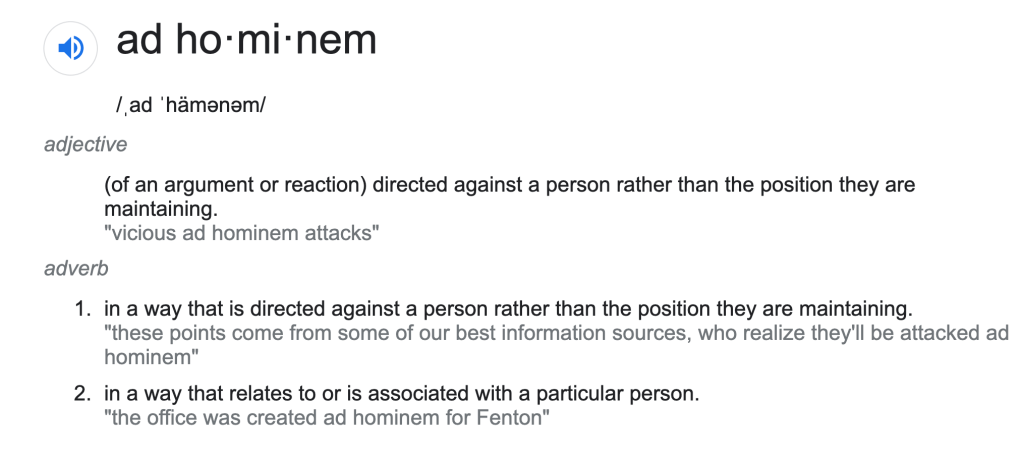
Nienhuys gradually taught me what an ad hominem was.
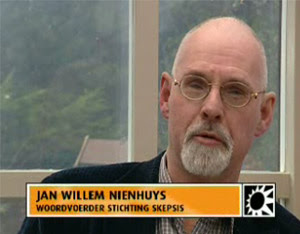
A bit of a silly comment from me that James Randi was physically so small, could count on a reprimand from Master Nienhuys: “This is an ad hominem, you shouldn’t do that.” I can’t find the relevant exchange anymore, but here’s a link to a detailed sample discussion page on kloptdatwel.nl about Randi and related like Woerlee, with me in the earlier days, in 2012. It took me a while, but: I learned !

With Nanninga I even came to a Flowerpower moment on February 6, 2011: Rob Nanninga: “@ Sten Luckily we agree on this (a warm virtual hug is coming your way ;-)).”
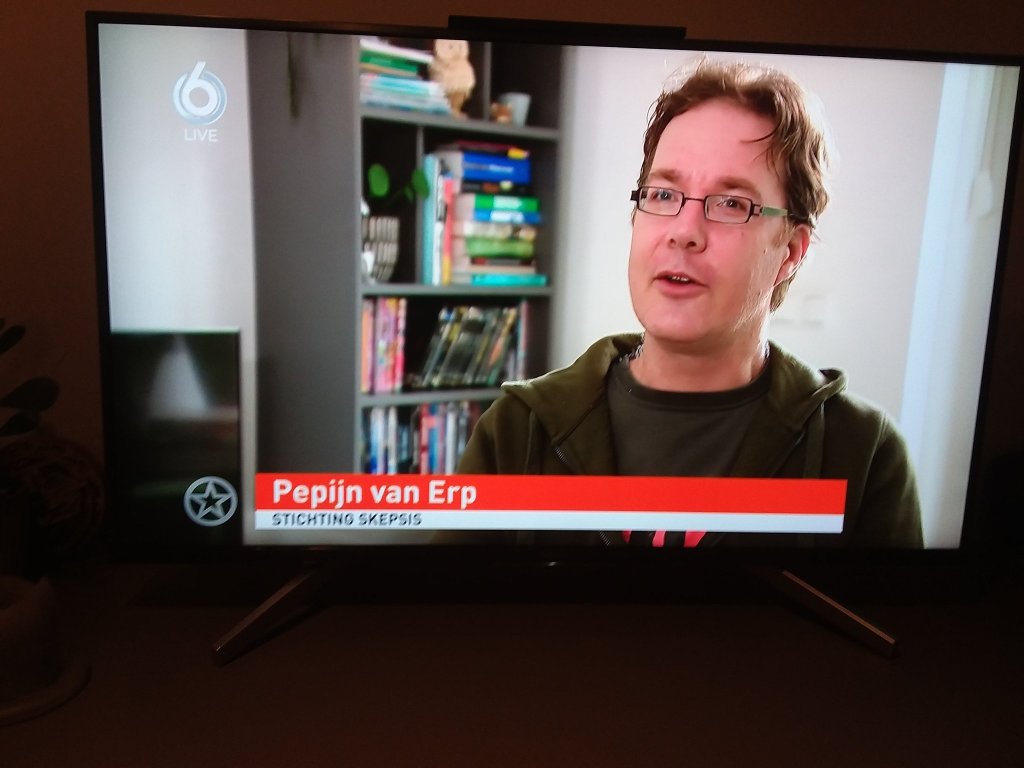
On kloptdatwel.nl, I also got to know Pepijn van Erp (1972, originally a mathematician) from a distance, because I had emigrated to America in October 2011, and Van Erp had ended up at the Skepsis Foundation at exactly the same time, 2011-2012.

Fast forward 2014. Rob Nanninga passed away! He was only 58 years old! I was deeply shocked, my Skepsis friend had traded the temporary for the eternal.
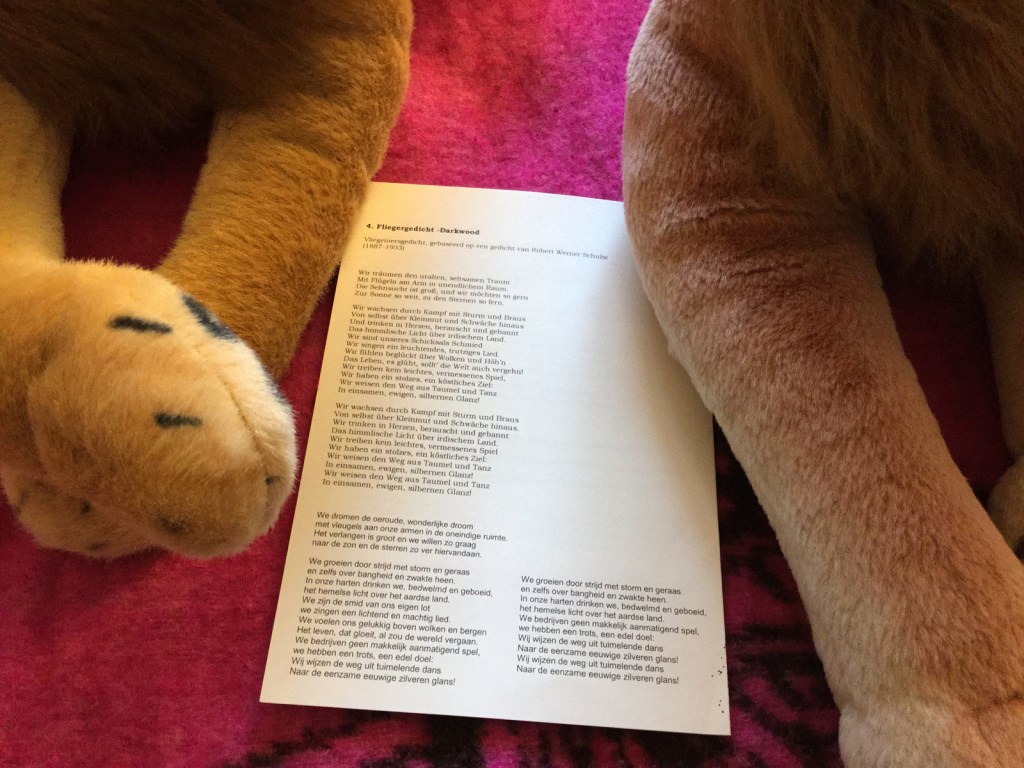
Pepijn van Erp took over from Nanninga and became content manager of Skepsis. He took over Rob Nanninga’s PC, which was chock full of Skepsis activities.
Together, Jan Willem Nienhuys and I worked on the translation of “Fliegergedicht” (by the German Neofolk band Darkwood that Rob loved) for Rob Nanninga’s In Memoriam booklet.
Kloptdatwel.nl 2011-


The discussion about all sorts of paranormal and less paranormal matters continued to grow on the Skepsis branch kloptdatwel.nl, formally operating independently, which has been officially managed by Maarten Koller since 2011, but was actually mainly in the hands of Pepijn van Erp. The moderation by Van Erp in particular was different from that on skepsis.nl under Rob Nanninga.
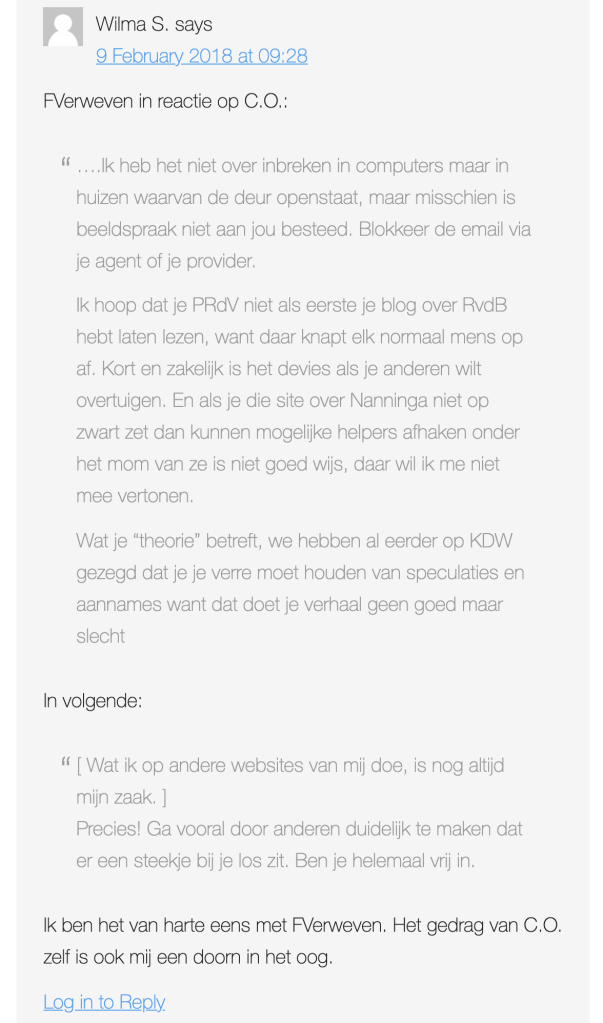
Now I am not only speaking about my own experience, but certainly also about that of a number of others, who, like me, had come more from the “alternative” – what is called – corner and with whom I also had contact behind the scenes. If I had felt relatively safe on Skepsis.nl, it was different on kloptdatwel.nl. I was attacked no matter what I said and however I tried to professionalize my discussion techniques. The moderator(s) allowed(s) people to be bullied.

You saw fewer and fewer commenters there and certainly a lot less famous people from both the skeptical and non-skeptical angles. Many commentators came and went, including people I knew personally, such as Rudolf Smit, Titus Rivas and board member of SPR, Study Association for Psychical Research, Fred Melssen. Behind and in front of the scenes, Rudolf Smit tried with all his might to reach the moderation, consisting almost exclusively of Van Erp, but it was like shouting in the desert and Smit also disappeared disappointed from the skeptical discussion stage.

A very small club of regular commenters consisting of Jan Willem Nienhuys, “Wilmamazone/”Wilma S”/”Wilma”, “JennyJo”, “MariannedO”, “Hans/Hans1263”, “RV”, “FVerweren/”FrankVerweven”/” FVerweven”, “Renate1” and a few more people held out and still do. This concerns almost largely anonymous accounts, that is to say: the identity of these people is not known to the visitors of the website.

People were also permanently blocked by Van Erp, such as “Ragnar” (pseudo), “Theo van Bergen” (pseudo), “Mopje” (ditto) and Harry Smit (real name). Incidentally, the regular commentators also got into a fight, for example “Wilma” and “JennyJo”, “Wilma” and “FVerweven”, “Wilma” and “RV” and “RV” and “FVerweven” went for each others throats.

The die-hard “FVerweven” seems to have closed the kloptdatwel.nl door behind him in 2021. “IkBenWeg“: “So you see, if there is no more love and attention for a website, so no strict moderation, then the sleepers and screamers will eventually take over the site. […] Congratulations RV, you have won the site is now yours. I wish everyone a happy turn of the century.”

There is one comment in particular from “FVerweven” on an article by Pepijn van Erp that stayed with me.
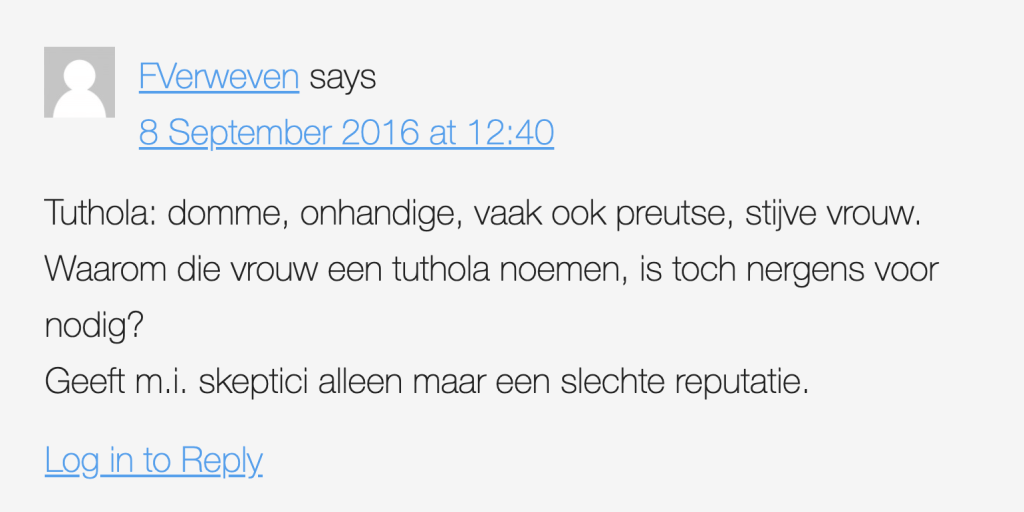
That comment fits within the framework of this blog: “FVerweven” on September 8, 2016: “Tuthola: stupid, clumsy, often also prudish, stiff woman. Why call that woman a tuthola, there is no need to do that, right? It’s only giving skeptics a bad reputation.” “FVerweven” aimed at the title of the blog that had immediately set the tone with the word “Tuthola”.

However, blood is thicker than water, and a small hard core remained. Hundreds of comments were sometimes lost at the same time, because commenters, angry at each other and at the moderation, removed them with great fanfare. Again and again I also felt unwillingness or downright hostility, also with the moderator Van Erp and occasionally also with Maarten Koller. In my case I got the impression that not my posts, but only my name and background mattered, so an all-round ad hominem, in which I as a human being was dismissed as a whole. Some of the die-hard commenters even demanded that I publicly distance myself from my out-of-body experiences books and delete my blogs about Rob Nanninga on the double.

When an article appeared on kloptdatwel.nl in 2012 that has some overlap with my books, my contribution was eagerly awaited and people started to grumble now that I was shining through conscious absence. I knew through experience what they were after here: bloody tearing the “para” theme apart and then throwing it out like rubbish, including baby with bathwater. The group of commentators and the moderation there will probably deny this vehemently, but my impression is this: there is no real openness to such themes. In short: I thanked for the “honour”.

After the umpteenth disappointing experience, I shrugged my shoulders and in 2018 I also definitively closed the door on kloptdatwel.nl. The feeling that prevailed among all those who have since dropped off can perhaps be expressed in this way: “You don’t have to knock on the door of the moderation, because you won’t find anyone there anyway”. At the mercy of the wolves! But why was and is it this way and why was there so remarkably little assistance from the moderation corner?

With the arrival of kloptdatwel.nl, the already difficult online Dutch and English dialogue between “Skepsis” and “Alto-land” gradually but unmistakably disappeared. Woerlee and Smit, and other closely involved people, were spotted less and less frequently, until both “parties” seemed to have almost completely withdrawn into their own camps, which in my personal impression still is the case.

Meanwhile, the importance of Facebook, but especially Twitter, grew. The friendly, slightly goofy, Dutch Hippie Flower Power Flowers and Butterflies Hyves (2004-2013) era, where discussions had also taken place, was a nostalgic, distant memory. Van Erp became increasingly active on Twitter. In 2018, as far as he and I are concerned, a turning point occurred. Although Van Erp had published an article in which I was mentioned as a co-main character and in which earlier Robbert van den Broeke cases were elaborated upon, the gap had become too great for me to return to kloptdatwel.nl.
The Pandemic

Fast forward 2020. The Pandemic had arrived! We all plunged into unknown territory and the battle over whether or not vaccinations, the Corona rules and lock downs, mandatory working from home, education via Zoom, mask obligation, vaccination certificates and what else they caused and still cause great unrest at a large part of society. Distrust of the government and mistrust of each other increasingly rose.

The typical Dutch word “wappie” in the sense of “wandering spirit” was initially only used occasionally during the crisis, but gradually it became more and more frequent until finally, at the time of this blog, autumn 2021, it really was the most used “special” word of the year.

Explanatory blogs, whether or not skeptical, have sprung up like mushrooms here and there, but core discussions about Corona and other skeptical topics were no longer mainly held in and under blogs, but mainly on Twitter, Facebook and LinkedIn.
Tweets are easily found by Google and other search engines and are quick and easy to quote, because: short. On Twitter, the character limit per post is currently 280 characters. And inserting a Twitter link url is a piece of cake. However, the limited framework of Twitter requires drastic curtailment, so arguments must also be mentioned in minimal word quantities and threads, sometimes with sixty parts, became inevitable and so something was found again: the Thread Unroller. By now I would describe the counterpart of the unlimited amount of comments and discussions on skepsis.nl among the blogs as extremely dull. What started to strike me more and more was the incredibly raw tone on Twitter, the lack, and sometimes even the complete absence of solid arguments, the profanity and the predominant anonymity of many posters.

When even the always very moderate and extremely well-founded co-founder of the Skepsis Foundation, Marcel Hulspas, started to go out on Twitter in an unmistakable tone, and even used the word “wappie”, I had to swallow.

But maybe Hulspas was shocked by it himself! 😉

A selective look, selected for the content of this blog, at opinion maker Chris Klomp‘s website, namely where it is about “wappies”, illustrates in my opinion the blind spots that exist on both sides, the “skeps and the altos”, of the (Corona -) struggle. I’ve put one sentence in red, which I think can be thought-provoking, given the rest of the titles: “Stop with that hatred towards journalists”. I have also put the use of the word “wappies” in bold.
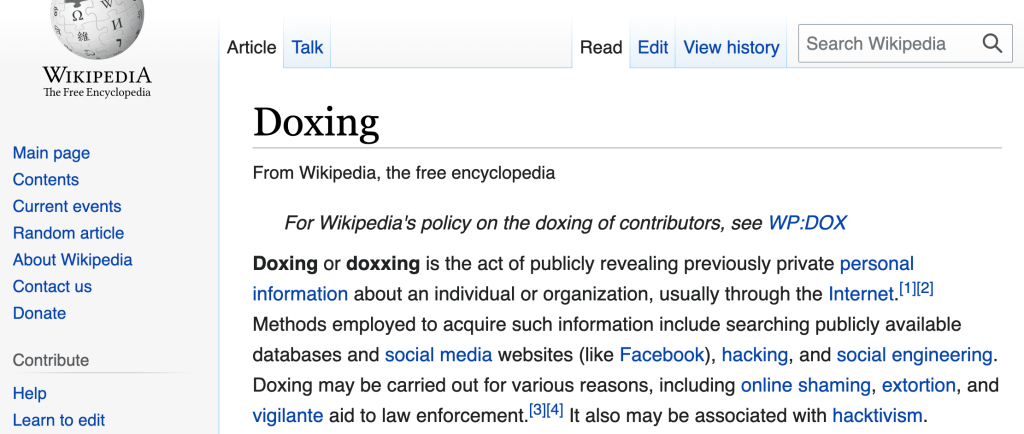
The war of words on Twitter often transitions seamlessly into doxing or doxing, so beyond the online frame of the tweet, with, for example, posting private addresses and employer names on Twitter.

For example, on August 15, 2020 Pepijn van Erp posted in response to a post from the Twitter account “Ethics is everywhere” with a photo of a Corona demonstration with, admittedly, blurred children with a “Star of David” the full name of the father of the two children. Although Gert van Dijk of the “Ethics is everywhere” account posted precisely to expose something, I thought that was a tweet that can cause extra rottenness. My assessment was correct, as it turned out, because soon after, for example, the unblurred photo of the children appeared (which is still online at the time of writing this blog). When I sent an alarmed mail to Jan Willem Nienhuys about it, Nienhuys did not respond. Van Erp did delete the tweet.
Block, blocker, blocked

In April 2020, I was suddenly blocked without explanation on Van Erp’s personal Twitter account, even after a few online inquiries. On Twitter I occasionally respond to him from my involvement with the Skepsis Foundation, to my knowledge and memory always in a good mood or civilized. I had not emailed him since November 2019. This requires a brief explanation. Van Erp and I e-mailed at our leisure, and there were many occasions because of the Robbert van den Broeke case and also because of kloptdatwel.nl. Because the Van den Broeke case was a long-lived one, the number of emails amounts to many hundreds, to be precise: 4483 emails from me to Van Erp, explicitly including many group emails, because many people participated in the Robbert van den Broeke discussion, and 945 emails from Van Erp to me. Exactly one year later, he also blocked me on the Twitter Skepsis account he manages. In my opinion this was of a different order. I haven’t done blocks at all for quite some time now (probably a few years now). After all: Twitter will remain visible, unless you lock your account completely. Blocking actually calls for taking screenshots, because you can’t join the discussion at the bottom of the tweet for your comment(s). With blocks you send a message to the other person: “You no longer exist for me”. I continue(d) to respond to Van Erp’s tweets, but because I had no other choice, indirectly, i.e. via screenshots, and certainly when I decided to write this blog about my disturbing observations about skeptical discussions. Here’s an example of my response.
He had briefly unblocked me once, when Eelco de Rook, an online Twitter friend, briefly discussed Van Erp’s blocking behavior on Twitter with me, but after a very short exchange in which, in my firm impression, Pepijn van Erp gave irrelevant arguments and just was out of focus, and I mentioned my observation of this too, I went back on his block.

His now fellow Skepsis board member, since about spring 2021, medical journalist Aliette Jonkers already blocked me in early 2020 after I tweeted about her participation about the Corona Virus in Koffietijd that I liked the “doctor look” of her profile picture more than her “glamor look”, which she mistakenly took as an insult. Which I also said conciliatory, but by then it was already too late. It was just a comment, not meant ad hominem, I only knew her from that profile picture where she wears a white blouse which created a positive “doctor feeling” in me. When I did respond substantively and substantiated it a little later, about flu figures in the US that I believe she had misinterpreted in her performance in Koffietijd, I never heard anything again and I remained blocked by her forever (my account name was still Robbert van den Broeke related @genverbrander10).

In fact, being blocked can feel like a form of censorship. Affected tweets will no longer be visible if you are logged in yourself and Twitter messages will constantly appear: “You can’t view this Tweet because this account owner restricts who can view his Tweets”.

What remains of enthusiasm and benevolence on the skeptic side if people who (partly) think differently want to contribute to discussions? At a certain point after Van Erp’s block, I was responded to on some of my tweets on kloptdatwel.nl, and Pepijn van Erp responded to kloptdatwel.nl as follows: “I deleted the discussion about Oomen anyway, it didn’t make much sense to me and just feeds her curious obsession with Skepsis, Kloptdatwel and my tweets.” Reactions about me, including his own reaction, have since been completely removed by Van Erp.

Behind the scenes I sometimes e-mailed Jan Willem Nienhuys about the increasingly absent discussion among the skepsis.nl blogs, and also about kloptdatwel.nl and the statements of Van Erp and also reported this a few times on Twitter because I like to work with an open visor. My more recent emails were also about ad hominems such as the frequently used word “incitement creationist” by Van Erp. But after Rob Nanninga’s death, and with a reserve that I increasingly thought I could detect in Nienhuys, Nienhuys and I no longer seemed on the same page. When I once criticized the ins and outs of Skepsis/Kloptdatwel, Nienhuys responded in an email of Thursday, December 22, 2016 that he was not open to criticism or feedback from people who “not even” subscribe or donate to Skepsis (I did in the past). I don’t see how that makes a difference. To my surprise, Jan Willem Nienhuys wrote to me that “Each man speaks in his own fashion.” and he did not respond at all to my ad hominem emails. The non-ad hominem rule that applied to me apparently did not apply to Skepsis board member Pepijn van Erp. An uneasy idea began to dawn on me: was there perhaps double standards here by the two mathematical board members of Skepsis: Nienhuys and Van Erp?
Very occasionally I also had contact via Twitter with Catherine de Jong of the Association against Quackery, who is closely involved in the Skepsis board and attends meetings. I asked her to talk to Van Erp to ask him to remove his blockade against me, because this does not create a uniform image among people that we, in particular Rob Nanninga, Jan Willem Nienhuys, Pepijn van Erp and I, scrutinized in the past together, such as the aforementioned Hoeven Robbert van den Broeke. This question was met with resistance. De Jong said that Van Erp had personal concerns, but when I stated that everyone has them and that in my opinion that is no reason for this kind of hostility, she fell silent.

The Pandemic continued to plague and emotions on Twitter rose, not least because of people like Janet Ossebaard, Donald Trump and QAnon supporters, but in my opinion certainly also by people who expressed their disapproval in increasingly strong terms. This was no longer a civilized discussion, but rather a bloody attempt to tear apart “adversaries”. Twitter’s Abuse button was clicked more than ever.

All these statements were taken 100% verbatim from Twitter accounts in 2020-2021 and expressed in particular on the following Twitter accounts: Skepsis board member @pjvanerp (the majority), Skepsis board member @aliettejonkers, @DanielTuijnman ea. The statement above left “Shut the f up, wappie” comes from Chris Klomp.
The price of hurtful words

Already in the early prelude to Skepsis, a very unsavory case had arisen, which showed that uttering suspicious, hurtful words can be very hard when someone is already feeling vulnerable. It concerns the case of the French psychologist Michel Gauquelin. The Mars effect hypothesis was first published by Gauquelin in 1955 and stated that Mars occupies certain positions in the sky more often in the birth of sports champions. Jan Willem Nienhuys had only started working with all the data after Gauquelin’s death, but this did not prevent him from attacking Gauquelin firmly posthumously.

This has been one of the biggest brain teasers among skeptics: is there still more than skeptics think possible? In 1991, Skepsis hosted a European skeptical conference, ‘A Critique of Astrology’, at which this Mars effect was discussed in detail. Participants included astrology/psychology leaders: Rudolf Smit, Geoffrey Dean, Suitbert Ertel and Michel Gauquelin. Gauquelin was beset by a deluge of skeptical attacks after the release of his Mars effect data, and the case has literally lasted more than half a century and well past Gauquelin’s death. This pen struggle also finds expression in the book Tests of Astrology (Page 79, edition 2016. Auteurs Dean, Mather, Nias & Smit): “Later, in Dutch, in his 2012 obituary of Paul Kurtz, Nienhuys says Gauquelin “alleged” the Comité Para had replicated the Mars effect, implying (wrongly) that they hadn’t, see […]. He then accuses Gauquelin of cheating (“I cannot call it otherwise“) and of deceiving people about his data, both of which are untrue, but says nothing about the extraordinary bad behaviour of Mars effect skeptics including Kurtz that led to accusations of self-serving bias, see […], the same self-serving bias that Nienhuys seems incapable of avoiding.”
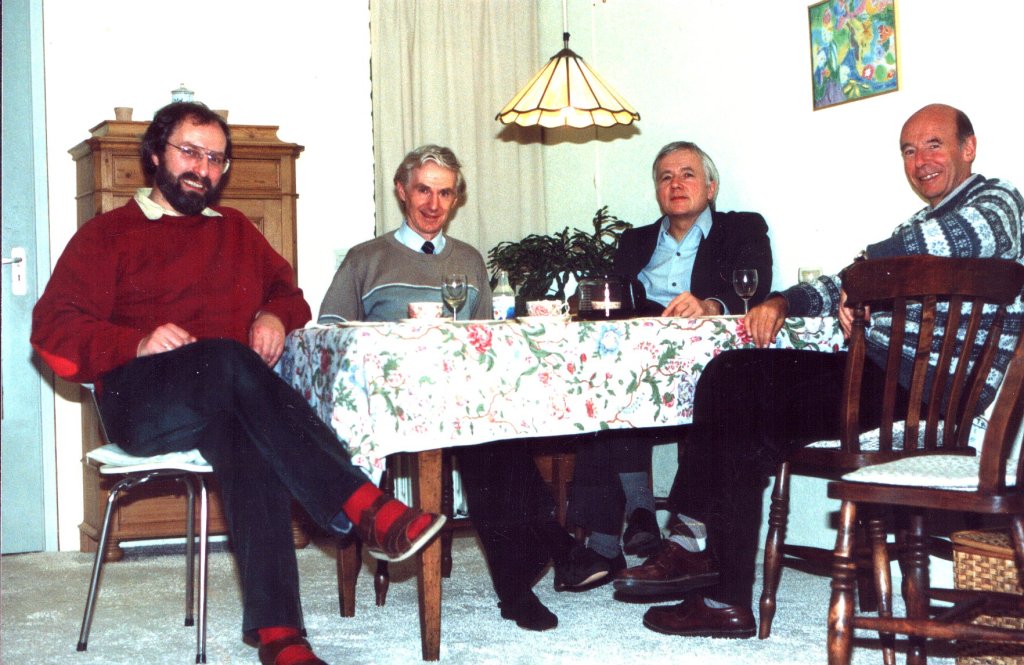
Gauquelin, at the age of sixty-two and 128 days after this skeptical congress, committed suicide, after his second wife had also left him, in this vulnerable time.
Behind the scenes there had been a big clash about this between Rudolf Smit and Rob Nanninga, when Nanninga saw a letter sent in by Smit in TvP (Tijdschrift voor Parapsychologie, In Vol 77, Nr 3, 2010) about this case a year and a half later. Smit had strongly criticized the working method of skeptics in general and Nanninga, who thought he also meant Jan Willem Nienhuys, had made a strict demand on Smit: rectification in the form of an apology. When it later transpired that Nanninga had not read the letter to the reader properly, he reneged on his hard demand and his commitment to both truth and softness proved to be true, for he admitted his mistake in conciliatory and remarkably soft words (full correspondence in possession of CO).

And also within the board ranks of Skepsis the water was (and still is?) bubbling vigorously. That started very early, when, in addition to Jan Willem Nienhuys and Rob Nanninga, Marcel Hulspas was also a board member. These three were there from the start, Nanninga is mentioned as a board member from the second issue of the Skepter. The colophon of all Skepters clearly shows how the positions shifted, new people came in and left, but the hard core, consisting of Marcel Hulspas, Jan Willem Nienhuys and Rob Nanninga, remained.

Until suddenly Marcel Hulspas resigned from the Skepter issue of December 2002. Behind the scenes, emotions ran high about the handling of Christian matters of faith in the Skepter, with Rob opposing and Marcel in favour. Jan Willem Nienhuys about the departure of Hulspas: “A few things changed at Skepsis at the end of 2002. Chief editor Marcel Hulspas of Skepter wanted to print a chapter of a book by the English psychologist Nicholas Humphrey, translated and summarized by me at his request. Rob was opposed: it was an over-simplified anti-religion piece, and besides it was very old cake, because it was a well-known Amnesty lecture that had been on the internet for five years already. Such old foreign scraps, that’s nothing for Skepter. Hulspas had been doing less and less of Skepter for a while. He had long been working on a book about the sources of the Old Testament, which finally appeared in 2006. He also made vague allusions to the expansion of Skepsis’ scope: not just UFOs, altos and astros, but a frontal attack on religion and never mind the freethinkers of “De Vrije Gedachte”. The result was that he decided to break with Skepsis immediately.“
That this struggle for “skeptical tolerance” is timeless is evidenced by a random sentence from the Wikipedia page about the prominent and already mentioned skeptic Paul Kurtz: “At the Council of Secular Humanism’s Los Angeles conference (7–10 October 2010), tension over the future of humanism was on display as Kurtz urged a more accommodationist approach to religion while his successors argued for a more adversarial approach.”

I have known this first color edition of the Skepter since the Robbert van den Broeke time 2005-2006 because of the “Paranormal blue tits”. At one point I had put the genverbrander.nl domain up for sale and I had promised the proceeds to the Dutch Bird Conservation. I had used the beautiful Blue Tit front for the website. Unfortunately there were no buyers and I transferred the domain name for free to Stichting Skepsis in March 2015 via Pepijn van Erp. Only since writing this blog did I know that this cheerful yellow-green issue of the Skepter with my favorite animal species on it: the bird! is Rob Nannninga’s hand in his first capacity as editor-in-chief of the “Skepter”.

Frictions or differences in ambitions were also apparent from the fact that Jan Willem Nienhuys made a trip to the Dutch Association against Quackery in 2009-2010, where he suddenly turned out to be a webmaster and published many articles there in a short period of time. I was very surprised about that at the time, because he suddenly seemed to have left Skepsis.nl and I emailed Nanninga and Nienhuys extensively about it. On Monday 11 May 2009, Rob Nanninga wrote to me: “They asked JW if he wanted to become website editor and apparently that appealed to him. I don’t know much about it. I also only knew that he had written a big book about China the day it was published.” and on the same day: “He actually switched, although he didn’t announce it (I only saw it when I looked at the website of the VtdK).” After more than a year it turned out that after some time Nienhuys’ emotions had run very high and he, in addition to being a spokesman, was no longer even a member of the Association against Quackery. Rob was hesitant about it and wrote, among other things, that he had more pleasant things to do.

Jan Willem Nienhuys’ Association against Quackery Exercise did not last long. About a year and a half later, in the fall of 2010, Nienhuys had left with a silent drum, towards the outside world, but with a loud one behind the scenes. Reasons for his departure were partly due to his dissatisfaction with the VtdK policy. Nienhuys criticized the VtdK because, according to him, it had not conducted its own research since time immemorial, but was always rushing to criticize research carried out by the Skepsis Foundation, furthermore it was mainly aimed at mere doctors’ input and according to him, sought publicity in a careless manner. I also emailed the VtdK to ask about this departure. On Thursday, November 25, 2010, I received what I think is a strange reaction. I will paraphrase again to respect email secrecy. It was confirmed that Nienhuys was completely gone after a disagreement and a proposal from me to design their Twitter logo (an idea I had at the time, don’t ask) was rejected because of my publications about out-of-body experiences and astral eroticism. After all, I belonged to the “parties contested” (this wording was used literally).
This is, of course, ad hominem as being placed over a person as a whole. After all: because of books about my “astral” out-of-body experiences, my graphic ideas were also rejected. It would have been understandable to me if I had been a medical quack, but my publications on out-of-body experiences are just that: a description and interpretation of universal consciousness experiences, which has nothing to do with medical quackery. This was also felt by Nienhuys who never saw any harm in my “astral activities”.

The aforementioned co-founder of Skepsis, Marcel Hulspas, turned out also not to be a fan of the Association against Quackery in 2013, as evidenced by the fulminating piece he published on ThePostOnline.
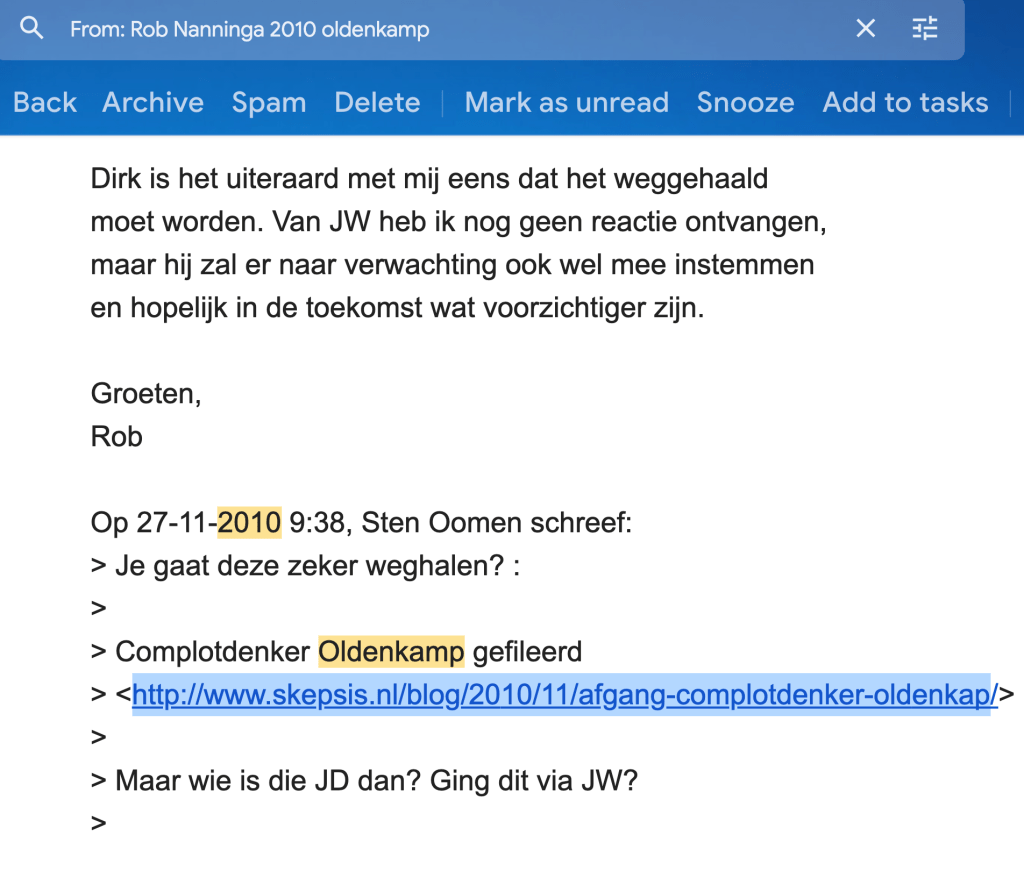
But things also did not always go smoothly between Nienhuys and Nanninga, with Rob Nanninga being the advocate of greater tolerance towards the actions of dissenters, such as “even” public speaking rights for people who “sell dangerous nonsense”. This became apparent in 2010 from a jousting back and forth following a Skepsis blog regarding a lecture by the still active Johan Oldenkamp. In an email that I believe Rob Nanninga was the only one ever to label “This mail is private” at the bottom of all his mails (not the mail shown in this paragraph), he wrote that his ethics differed from those of Jan Willem Nienhuys (paraphrased and under omission of the rest). The blog in question was later removed from the Skepsis website altogether due to this haggling.

Most words don’t hurt. But words that lack tolerant subtlety, trust in the goodness of the innkeeper or substantiation, or a combination of these troublemakers, can have very serious consequences. These kinds of words seem to be on the rise, which was shockingly reflected in the (Social Media) Era of Donald Trump with the absolute anti-climax of the storming of the Capitol that I, as an official American since 2017, watched with tears in my eyes from a safe distance in Davis, California.
The consequences of hard or derailed battles of words can be financial. Lawsuits come with a hefty price tag. Actions and deeds can also arise from it, crimes such as arson, attacks, sometimes even fatal, as was the case with the QAnon several times.
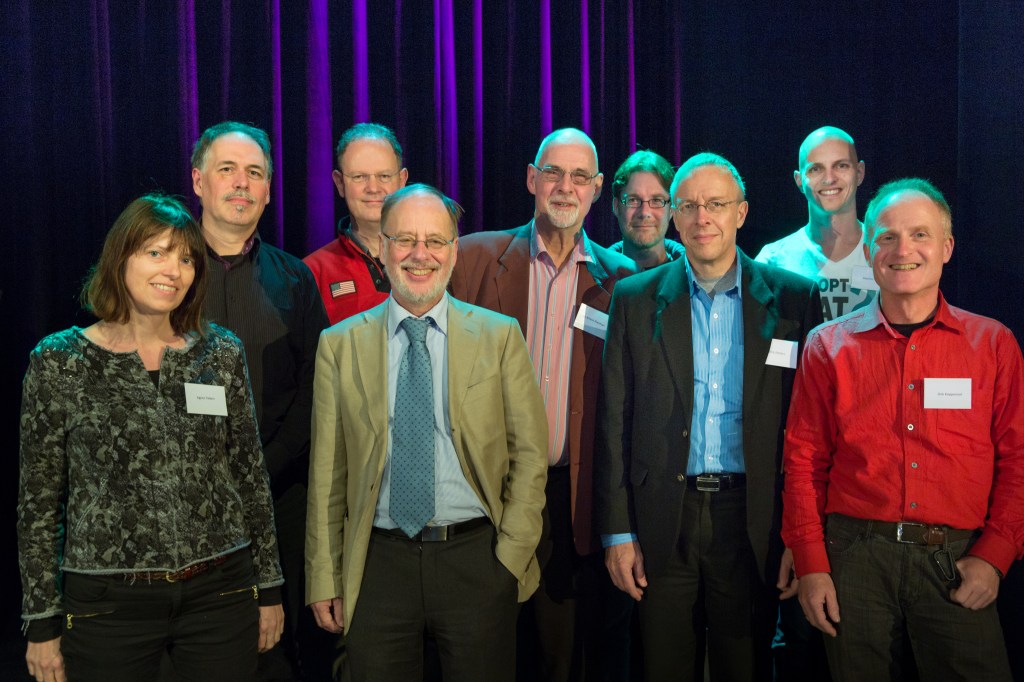
Since my story continues to follow the Skepsis Foundation, here too follows the example of differences between the online active board members of the Skepsis Foundation. Skepsis board members who were and are highly visible online or publicly (TV, radio, etc.) were always in the minority. If Rob Nanninga successfully managed to stay out of the hands of angry recipients free of charge during all those years 1987–2014 with his often lengthy and in-depth articles on thorny subjects, Van Erp was unable to do so in a much shorter period of time.

Nanninga had to take on a one-time lawsuit in 1994-1995 against prosecutor Wies Moget, who talked people into false and harmful memories in a cult-like setting, which Nanninga had successfully brought up, after which Moget’s institute no longer received financial support from the Dutch GGD and social services. However, he was so substantiated that all charges were dismissed by the judge and Moget had to reimburse all legal costs incurred. Rob Nanninga is also known for his rather descriptive pieces in which the accusation usually only emerges in a subtle or consciously hypothermic way. He didn’t use explicit, offensive terms, and when he did use them, they certainly weren’t numerous, well-embedded, and clearly not written in the tenor of loose hail.
Jan Willem Nienhuys speaks about Rob’s careful and mild character: “Many people have testified how Rob always remained polite and respectful in his contacts with people he disagreed with. […] He was a perfectionist. His legacy is about 600 pages of thoroughly researched articles. […] Rob was in a sense the skeptic’s skeptic. Many skeptics and rationalists have a tendency to preach for the converted, but this wasn’t Rob’s style. He was strict in his views, urban legend researcher Peter Burger wrote to me, but mild in his statements and communications. He was typically a reasonable and cooperative man. […] Rob sometimes explained that when he started on a subject, he often didn’t know anything about it, but then he studied it until he knew it thoroughly. You can imagine this was hard work, with sometimes surprising results. […] He always was worried that he would make a mistake that would cost Skepsis its scientific reputation.“
In line with this: Nanninga wrote to me in response to his lengthy article about the Moon sect that he was a little tense whether someone was going to sue him, but that never happened, and the Moget case cost Skepsis nothing or very little in terms of financial costs.
The court in Groningen rejected the demand on 15 December 1995, because it concluded Skepsis had not been unnecessarily offensive or grievous, and Nanninga had backed up all of his claims well. Wikipedia

As mentioned, the Skepsis board member of Erp did not manage to stay out of serious Skepsis problems. He wrote a blog about the American-Italian nuclear physicist Ruggero Santilli and used a few sentences and formulations that inflamed the Santillis to such an extent that they (Ruggero Santilli with his wife Carla in his wake) sued both Pepijn van Erp, Skepsis chairman Frank Israel and also Van Erp’s provider in 2016-2017 as “bearer of the offensive words”. Frank Israel had nothing to do with it at all, but the offended Santilli was unstoppable and if Van Erp and Israel did nothing, Israel (and of course Van Erp too) would find his entry options into the United States severely hampered because of this lawsuit that would then remain pending. That would indeed have been a problem for Israel, as he regularly traveled to the United States as an astronomer.

In particular, Van Erp had used the following sentences, which Santilli saw as a potential loss of income, with the title itself in particular being a thorn in the side: “The Continuing Stupidity of Ruggero Santilli”, “fringe scientist Ruggero“ and with the venom in the tail, the last sentence: “Is Santilli just a mad professor? Or is he a cunning scam artist trying to sell his ‘Santilli-ofocus-scopes’ (or even better: stock in his businesses) to people who fall easily for sciency sounding nonsense? Maybe both …” Perhaps Van Erp could have removed the text altogether or removed and modified the offending sentences, but he didn’t. And that cost him a very expensive case, a lawsuit that cost the Skepsis Foundation almost a quarter of a million dollars (more than two hundred thousand euros). Santilli wanted compensation that could possibly run into the millions.

Rob Nanninga had managed to raise the Skepsis buffer to a comparable amount, a quarter of a million euros, through a very frugal lifestyle (he lived in his mother’s house and charged very modest fees for all his Skepsis services). Jan Willem Nienhuys about this sober monk mentality of Rob: “The financial situation of Skepsis is healthy, but Rob shortchanged himself, by allowing himself to be grossly underpaid. Actually he hardly thought about money, except when his banking account was empty. He was working on Skepter day and night. It’s ironic that the enemies of Skepsis claim that we are handsomely rewarded by Big Pharma. “
Skepsis was up to the mark and successfully appealed to the donors, with several (very) generous donors (donations of up to 20,000 euros from one generous donor) who wished to remain anonymous. The case resulted in an exemption for Frank Israel, because he demonstrably had nothing to do with it, and a settlement for Van Erp, in which Van Erp adjusted the title and removed the offending last sentence. But the money spent on lawyers never came back. Skepsis managed to bring the buffer back to the old level over time through the very loyal support of generous supporters. Jan Willem Nienhuys also wrote an article about it in the Skepter.

Not long afterwards, in 2018-2019, Pepijn van Erp had another lawsuit that was also about offensive words from Van Erp. A book review in which Van Erp had used the word “plagiarism”, among other things, angered publicist, photographer and entrepreneur Willem Middelkoop and he took Van Erp to court. However, the judge rejected the demands.

Screenshot Ionica Smeets tweet
How then?

Before I present a series of skeptical fallacies below, I gradually arrive at the summit. In my opinion the conclusion should be that the discussion between “skeps” and “altos”, in a newer guise also called “skeps” and “wappies”, has never been really good. And that the Skepsis board was sometimes rolling over the ground with each other. And with their “sister organization” The Association against Quackery! There were many people such as Rob Nanninga, Rudolf Smit and I who would have loved to have stayed in the colorful discussion, but the battle often just became too hard and people got hurt, and did not dare or no longer dare. The same thing is happening now, and in my view ten times more, on social media after the world plunged into the Pandemic. Times of crisis add fuel to the fire because people get stressed.
Explicitly on a personal note, I want to go a bit more in-depth, and since this is a blog, I think I’m allowed to. What is it that discussing with dissenters turns out to be so difficult, and quarrels seem almost inevitable? Is one’s own being right so important that it is more important than the fellow man who (partly) thinks differently?
My theory is that the explanation can be found in the French mid 17th century word “chagrin“, Dutch “chagrijn(ig)”. In Dutch, this word is more commonly used to indicate a bad mood. The deep hidden meaning of people lashing out at each other, berating each other, not wanting to hear each other, blocking each other is a feeling of not feeling well, which I believe stems from sadness and “life stress”. And seldom are the people who do not know sadness and/or life stress at all! How we deal with that is another matter.
Earlier I asked the question why the feeling of “Thrown to the wolves” on kloptdatwel.nl is so strong. I have come to the conclusion that the moderator himself was at the mercy of the wolves and that no one stood up for him then. Sadness. That is a vicious circle that can only be broken with love.
This blog arose out of dissatisfaction with, in particular, the skeptical actions and expressions of Skepsis board member Pepijn van Erp. I don’t want to beat around the bush on that. But I think I now know what Van Erp’s “chagrin” consists of after experiencing a real and intense Californian trip (behind the scenes I am willing to explain this partially). That immediately made me 100% more understanding, I was even off the map for days out of pure compassion. I reported this on Twitter. But when I saw new “not-niceties” on Van Erp’s Twitter account after my Twitter notifications, I thought that everyone makes choices in this life. Everyone has traumas and “challenging” qualities to a greater or lesser extent, as the Americans say so beautifully (“challenge” instead of “weakness” or something like that). That is why I believe that adjustment is desirable in any case.
In this regard, I would like to point out to anyone without accusing fingers what unites us: all the sadness and happiness that comes with living on this incredibly rare and beautiful planet. A planet that is under heavy pressure right now, which is reflected in Climate Change. The news doesn’t make you happy unless you are a sadist. International cooperation without the exclusion of any country has proved to be the only option. Only when all countries take each other seriously and try to work with the differences and the similarities does this incredibly colorful planet have a chance again. And with people, animals and nature in general. At the micro level, this single opportunity translates into mutual respect for differences and similarities. Don’t use words like “wappies” and “You’re stupid” anymore, no one is worth more than the other. Being right or wrong is less important than a civilized society in which no one is excluded. So don’t use fallacies, don’t berate, don’t block, have fun and positive lessons! in the differences instead of feeling disgust, and from there try to secure the future for the children of this earth, children of men, children of animals and all children of nature.
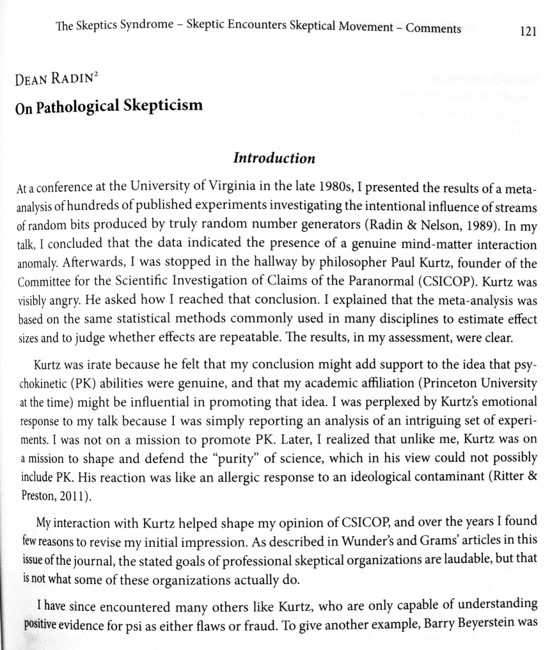
And what is also important: if you do want to discuss, try to be really open to arguments that make sense. Every self-respecting discussion participant must be prepared without fear and I would even say: to proudly leave certain prejudices behind and if necessary even throw out entire parts of their own world view. Proud of the proven courage you have shown. If you are not willing to adjust or learn something, you can speak of a false position towards the other. That’s not respectful. For me, Rudolf Smit, who put his astrology ideas aside, even when this caused him a serious identity crisis for three years, is a great example.
However difficult and laborious it may be, the discussion must remain, and may even be completely omitted during blessed moments of sitting together around a beautiful campfire. Hey, if the aliens really do arrive in such a way that we see it too, then we don’t want to just have to explain with redheads of shame what all those smoking rubble and word-debris on the earth mean?
* Extract from magazine > illustration accompanying this paragraph is from Journal of Anomalistics / Zeitschrift für Anomalistik, Vol 21, Issue 1, 2021, published by Society for Anomalistik, Psychology and Psychohygiene
Mrs Screenshot

Someone suddenly called me “Mrs Screenshot” on Twitter. Indeed I take a lot of screenshots, this has grown spontaneously. Only recently did I get to my take on this side of me. I once again had an idea and it concerned the nostalgic Dutch TV series Tita Tovenaar:
My father is a wizard,
It’s real, it’s real, it’s weird but true
A Tita Wizard,
It’s weird, it’s weird, it’s weird
He taught me too
But sometimes things go wrong
And if it doesn’t go the way I want, I’ll do this,
And everything stands still!

What is a screenshot other than a freeze of the situation? Not! It’s exactly that: you clap your hands (shift+command+4 on the MacbookPro for example) and the situation comes to a standstill. You’ve frozen it, for eternity if you must, or at least for as long as the digital version is preserved. It can make people uncomfortable because nobody is always at their best. Screenshots can shed light on the path and if every day is hit with the fallacies and the name-calling, then we should really scratch our heads and adjust each other respectfully.
With the following list of fallacies and a few other things that I have named myself, because I could not find the correct existing name, I want to expressly say that as far as I am concerned this is not a game whether I have given the correct name of the fallacy in the screenshot. Anyone who thinks that is the case may not have a clear idea of the meaning of my blog. I’ve consulted a few reputable lists and they also say that it is sometimes difficult to find the right denominator, also because a fallacy sometimes seems to fall under a few umbrellas. I would like to invite the reader to join me in looking at the kind of fallacy and, if necessary, come up with a different category. It’s not about being right with this list, it’s about showing something. I was accused on Twitter of leaving out necessary context with my screenshots and referencing the skeptic fallacies. My reaction to that is that the fallacies really usually stand on their own. If someone shouts: “You have a lower education than me, so shut up”, then that is a fallacy, even without context, and in this case it is an ad hominem. If someone just says: “Wappie, shut up”, then that is a fallacy, and that is from the category “Dismissal without arguments”. Only in rather rare cases, in my view, is a more elaborate context indeed necessary, such as the one time on Twitter when I purposely built in an ad hominem in response to someone who really didn’t understand how Pepijn van Erp was adhominating. I only added “A H” as an alert (but that alert was not detected!). The person immediately fell into my educational trap, but had already blocked me before I could explain the context of my ad hominem.

Incidentally, in my opinion, people are now increasingly shielding with “fallacies knowledge” in itself, so again as a “counter-argument” in itself. Perhaps people can think differently about things, but I think that after this summary of screenshots, most readers will understand where my concern lies.
Fallacies and other not-niceties
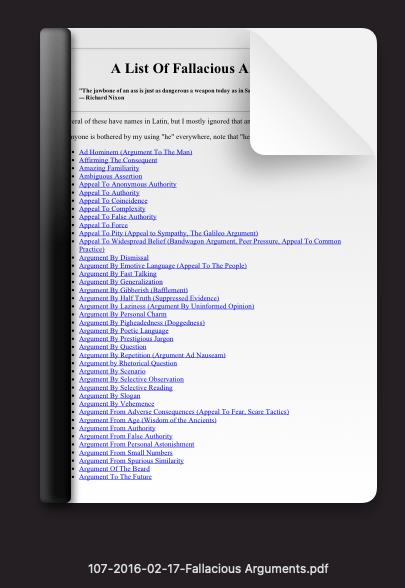
There are many great lists on the internet about faux-pas in discussions and these lists of wrong types of arguments – sometimes you can hardly even call them arguments – are long. I’ve worked with these two lists and many “arguments” fall into more than one category, for the most part, I’ve only classified the screenshots once, file names give clues about other possible categories…
Update August 24, 2022 f.f.
Less than a year has passed since this blog was first published. At a global level, unprecedentedly intense things have happened and are still happening, the pandemic that just won’t budge, even though many people like to pretend it’s over, yet another virus that has now suddenly started actively traveling across the border, climate disasters in the form of daily, new dizzying weather records, droughts and floods, the Russia war that broke out almost parallel to the start of the Chinese Year of the Water Tiger, which started in February of this year. The Water Tiger lets out his extended roar in full regalia (still 5 months to go, folks). And the emotions among people are not left behind. The World Peace, which wants to come, is beyond doubt for me personally, but asks of us that we treat each other and the earth correctly, this is my contribution to that.
With a blue sphere / 🔵 2022 / I indicate the new fallacies, and with an example based on Pepijn van Erp, / 🟢🟢🟢🟢🟢🟢 2022/, I also indicate how a fallacies can be classified under a whole series of denominators. I have selected six of them for this purpose, but I am willing to bet that you will find even more categories. It’s still not about the “I’m right” category game, it’s about us arguing correctly. The whole of collected types of fallacies, which also still grows organically, is in any case a complex to understand whole, therefore one should not get fixated by these categories, but simply learn to understand and then also apply that there is indeed such a thing as an impure and pure as possible way to discuss with people. In other words, the categories are a tool, not an end in themselves.
Newly inserted fallacy: Motte-and-bailey
Ad Hominem (Argument To The Man)



























Affirming The Consequent
Amazing Familiarity

Ambiguous Assertion

Appeal To Anonymous Authority
Appeal To Authority



Appeal To Coincidence
Appeal To Complexity
Appeal To False Authority
Appeal To Force
Appeal To Pity

Appeal To Widespread Belief (Bandwagon Argument, Peer Pressure, Appeal To Common
Practice)
Argument By Dismissal










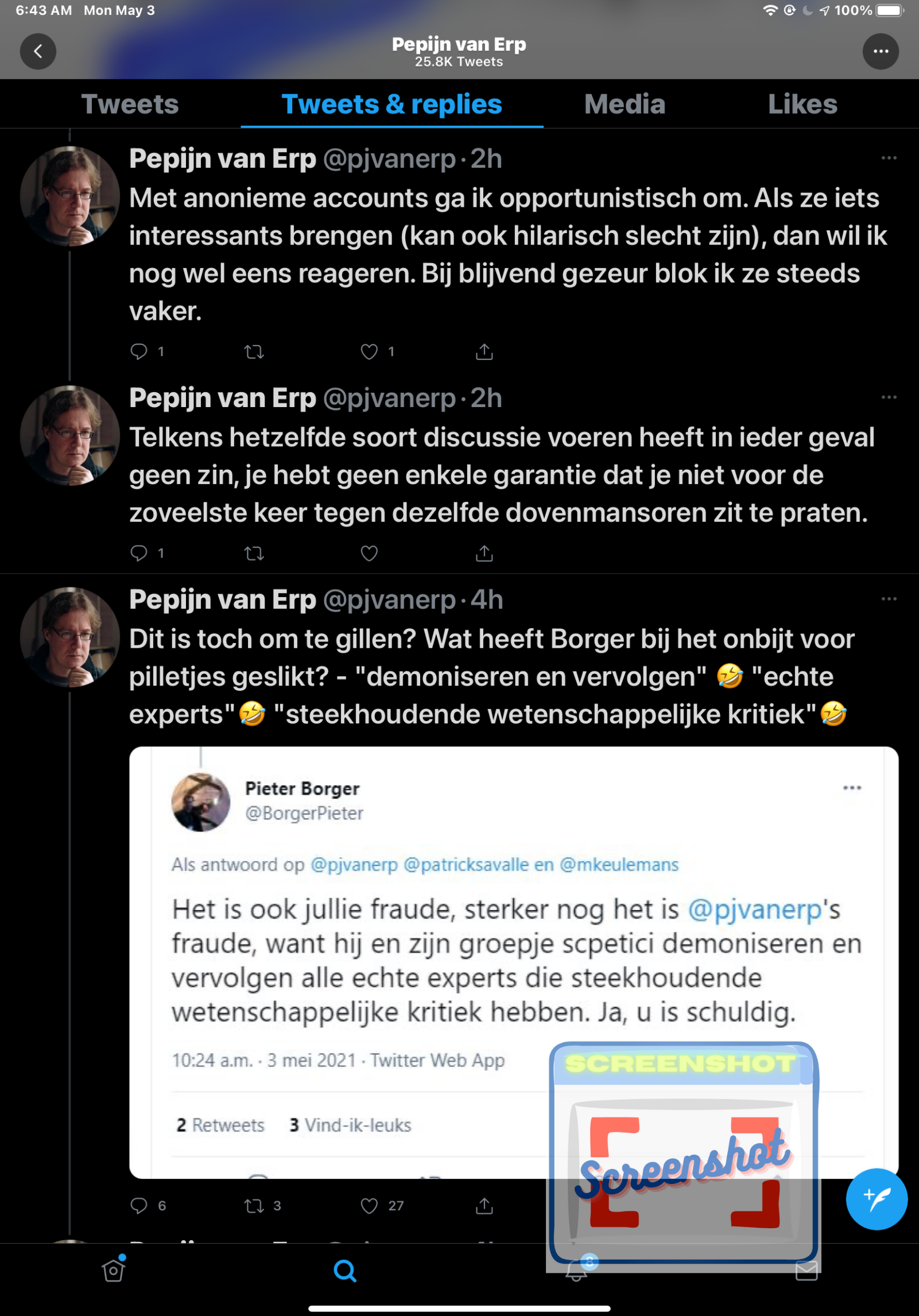

Argument By Emotive Language (Appeal To The People)










The small group that is left becomes more and more aggressive.
Do you know why? FREEDOM is WINNING from Dictatorship. 🥳
Our months of commitment is rewarded! ❤️
#FuckGovernment”


Argument By Fast Talking
Argument By Generalization
Argument By Gibberish (Bafflement)

Argument By Half Truth (Suppressed Evidence)

Argument By Laziness (Argument By Uninformed Opinion)
Argument By Personal Charm
Argument By Pigheadedness (Doggedness)
Argument By Poetic Language
Argument By Prestigious Jargon
Argument By Question
Argument By Repetition (Argument Ad Nauseam)
Argument by Rhetorical Question

Argument By Scenario
Argument By Selective Observation

Argument By Selective Reading
Argument By Slogan

Argument By Vehemence + Vulgar Language (added December 6, 2022)








Argument From Adverse Consequences (Appeal To Fear, Scare Tactics)

Argument From Age (Wisdom of the Ancients)
Argument From Authority
Argument From False Authority
Argument From Personal Astonishment
Argument From Small Numbers
Argument From Spurious Similarity
Argument Of The Beard
Argument To The Future
Bad Analogy
Begging The Question (Assuming The Answer, Tautology)

Burden Of Proof

Causal Reductionism (Complex Cause)
Contrarian Argument
Changing The Subject (Digression, Red Herring, Misdirection, False Emphasis)







Cliche Thinking
Common Sense
Complex Question (Tying)

Confusing Correlation And Causation
Contra Stichting Skepsis Statuten Objectives
The Skepsis Statutes (New category, not from main list, inserted by CO on December 6, 2022.)

Disproof By Fallacy
Dehumanization (Not from main list, inserted by CO)










Doxing (Not from main list, inserted by CO)








Equivocation

Error Of Fact

Euphemism
Exception That Proves The Rule
Excluded Middle (False Dichotomy, Faulty Dilemma, Bifurcation)
Extended Analogy

Failure To State

Fallacy Of Composition
Fallacy Of Division
Fallacy Of The General Rule
Fallacy Of The Crucial Experiment
False Cause
False Compromise
Genetic Fallacy (Fallacy of Origins, Fallacy of Virtue




Godwin / (Not from main list, inserted by CO)




Having Your Cake (Failure To Assert, or Diminished Claim)
Hypothesis Contrary To Fact
Inconsistency
Inflation Of Conflict
Internal Contradiction
Least Plausible Hypothesis
(Pure) Malice (new category, newly inserted by CO on January 4, 2022)

“Serial plagiarist”.
But in fact, there is a whole fallacies cluster in these tweets, up to you to discover, like I did… https://twitter.com/pjvanerp/status/1478049826075987975?s=21 https://twitter.com/pjvanerp/status/1478022936497901575?s=21

Lies

Meaningless Questions
Misunderstanding The Nature Of Statistics (Innumeracy)
Moving The Goalposts (Raising The Bar, Argument By Demanding)


Impossible Perfection)
Needling
Non Sequitur
Not Invented Here
Outdated Information
Pious Fraud
Poisoning The Wells


Psychogenetic Fallacy
Reductio Ad Absurdum
Reductive Fallacy (Oversimplification)

Reifying
Short Term Versus Long Term
Slippery Slope Fallacy (Camel’s Nose)


Special Pleading (Stacking The Deck)

Statement Of Conversion
Stolen Concept
Straw Man (Fallacy Of Extension)


Tu Aussi, Brutus / You Too, Brutus – Doing Things Yourself That You Blame The Other (Not from main list, inserted by CO)





Two Wrongs Make A Right (Tu Quoque, You Too)
Weasel Wording
The next danger?

And the next danger may already be lurking. The new development manifested itself to me on September 25, 2021 when Pepijn van Erp suddenly started talking about a new book by philosopher Cees Zweistra, “Truth seekers”, “They are not crazy, they are not stupid. They are evil“. Dangerous, because: if you start portraying a certain part of your society as “dangerous people”, what is the next step? That is a ball that I would “like” to throw at you as a reader. Nuf said.


With thanks to Eelco de Rook and Rudolf Smit
Constantia Oomen



0 Comments